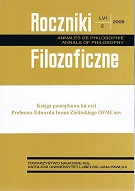O uzasadnieniach przekonań religijnych
On Justification of Religious Beliefs
Author(s): Józef HerbutSubject(s): Philosophy
Published by: Towarzystwo Naukowe KUL & Katolicki Uniwersytet Lubelski Jana Pawła II
Keywords: classical foundationalism; spontaneous beliefs; properly basic beliefs; numinous experiences; genuine theistic beliefs; klasyczny fundacjonalizm; przekonania spontaniczne; przekonania trafnie bazowe; doświadczenie numeniczne
Summary/Abstract: Belief is a mental state, its content being the statement of a certain state of affairs. With respect to the manner they arise, we divide beliefs into spontaneous and reflexive. When we take into consideration their bases, we speak about basic beliefs and beliefs derived from others. The terms “spontaneous belief” and “basic belief” have various meanings, but they are equivalent with regard to their range. Contemporary religious spontaneous and basic beliefs have various forms. In the Christian religion we speak, among other things, about “numinous” beliefs, as described by R. Otto, and A. Plantinga’s “properly basic” beliefs. According to Otto, numinous experiences (of that which is “tremendum et fascinans”) are a source of firm beliefs for man, i.e. he has had contacts with some objective manifestations of divinity. Plantinga (whose thinking belongs to a more “naturalistic” strain) writes about properly basic beliefs, such that arise spontaneously in man (if he is not depraved by sinful life) who remains under respective circumstances. Such beliefs are the grounds for theistic derivative beliefs. The arguments for the truthfulness of the beliefs of the first and second type bring forth a series of questions, and they are constantly discussed by philosophers of religion.
Journal: Roczniki Filozoficzne
- Issue Year: 56/2008
- Issue No: 2
- Page Range: 71-82
- Page Count: 12
- Language: Polish

